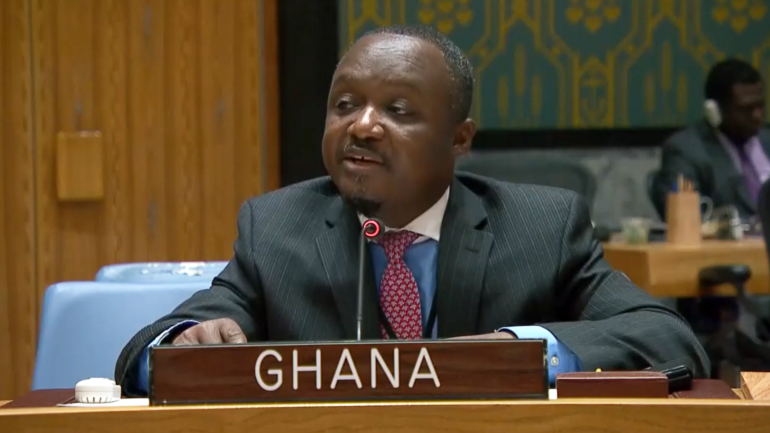United Nations Security Council Meeting on the Middle: The situation in Libya

- Posted by admin
- Posted in Statement & Remarks, UNSC
Mr. President,
I would like to join previous speakers in thanking Mr. Karim Khan, Prosecutor of the International Criminal Court (ICC), for briefing the Council on the activities of the Court on the Libyan file and to also express my thanks to Ambassador Taher M. El-Sonni of Libya for participating in this meeting.
Mr. President,
Ghana notes, with appreciation, the well-structured report with a proactive approach towards dealing with the situation in Libya. Of particular note is the paragraph that deals with the way forward as this gives a sense of direction to Council Members on the approach that the Court intends to adopt in conducting its investigations and dealing with the issues.
On the substantive issues raised in the report, Ghana wishes to highlight the following three points:
(a) First, we reiterate the shared conviction that impunity cannot and must not be allowed to stand wherever it occurs and by whomsoever.
i. In this respect, we reaffirm the position that all individuals facing ICC arrest warrants for their alleged crimes committed in Libya, including genocide, war crimes, and crimes against humanity, should be made to face the course of justice and given an opportunity to account for their actions or inactions as it relates to the very serious crimes they have been indicted with.
(b) Secondly, whilst calling on the Court to carry out its mandate enshrined in the Security Council referral, Ghana notes the challenges facing the Court in the light of the current complex political and security situation in Libya. It is, however, gratifying to note the approach being taken by the Court by triggering the principle of complementarity, which is a core principle of the Rome Statute. The Court, by engaging with the relevant Libyan national authorities, has taken a positive step in confidence-building that can yield the desired results. After all, it is primarily the responsibility of States to protect their citizens, and as such, the State must be consulted in such matters. We, therefore, encourage the Court to continue to work with the
Libyan judicial system and provide the needed technical and capacity building support. Certainly, the independence of these national courts should be paramount in the capacity-building efforts. We take this opportunity to call on the relevant stakeholders in Libya to give unfettered access to the team of investigators from the Court so that they can carry out their work effectively and efficiently.
ii. In view of the political situation in Libya, Ghana believes that the proposed signing of the Memorandum of Understanding (MoU), which should have the commitment of all relevant Libyan stakeholders, is also a step in the right direction as that will give a political commitment to the whole process as soon as the situation in Libya normalizes.
(c) The third issue of importance to Ghana is witness protection: before, during and after the trial process.
i. As the Court proceeds with investigations into the cases in Tarhuna where 27 mass graves have been discovered, with 338 residents missing between 2014-2020, it is important to underscore the fact that the Court needs to put in place efficient mechanisms that will protect witnesses. In that connection, Ghana calls on the Court to take into
consideration the involvement of victims in the whole process and give them the needed protection before, during and after the trials. We believe this will give victims the required confidence to testify during trials as it has been observed that in some instances witnesses have been recanting which adversely impacts the case for the prosecution and invariably casts a slur on the Court.
ii. In carrying out its investigations, the Court should also turn attention to getting witnesses outside Libya in view of reports of attacks on migrants some of whom may be survivors of these attacks. In that regard, it would be useful if the Court seeks the cooperation of neighbouring states as part of the investigation, particularly, by eliciting evidence from migrants who had escaped from these atrocity crimes and may be seeking refuge in these states. Ghana notes with appreciation, in this regard, the ongoing cooperation between the Court and external partners such as The Netherlands, United Kingdom, Italy, and EUROPOL to gather credible evidence. We call on other States and relevant international agencies that may have relevant information to assist the Court in carrying out its investigations to do so.
Mr. President,
In concluding, I would, once again, urge the Prosecutor to continue to look towards the evidence to deliver for victims, fair and equitable justice for the people of Libya as well as migrant victims from other states. Ghana, therefore, continues to hope for a balanced and global approach to the investigation of crimes within the jurisdiction of the Court, devoid of the perceived region-centric approach.
I thank you.
